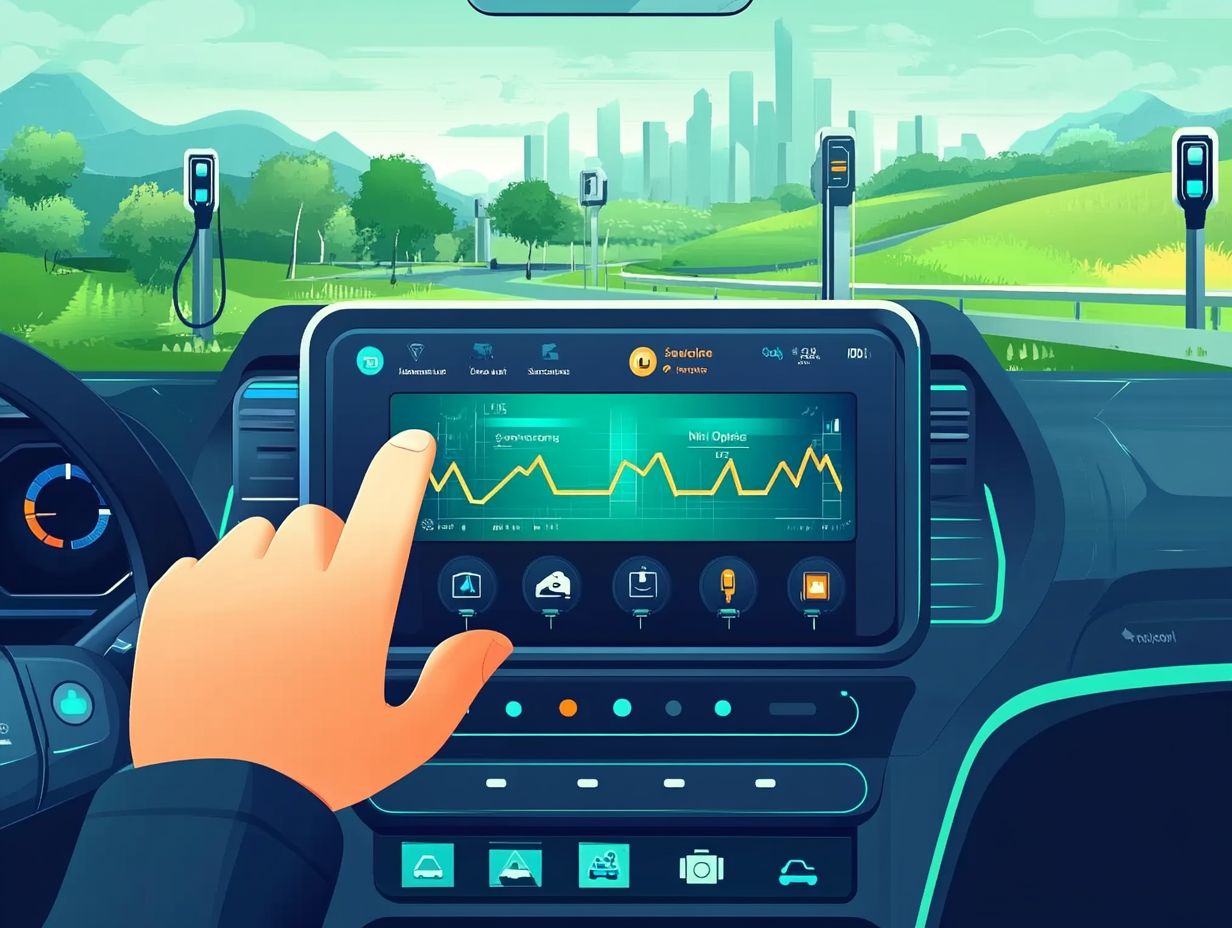The Importance of Regular EV Software Updates
As electric vehicles (EVs) soar in popularity, grasping the significance of software updates becomes crucial for you as an owner. These updates enhance your vehicle s performance and efficiency while strengthening safety features.
Ignoring these updates could expose you to security vulnerabilities and system failures. Stay informed and keep your EV performing at its peak!
Contents
- Key Takeaways:
- Understanding EV Software Updates
- Benefits of Regular EV Software Updates
- Potential Risks of Not Updating EV Software
- How to Keep Your EV Software Up-to-Date
- Frequently Asked Questions
- What are EV software updates and why are they important?
- How often should EV software updates be performed?
- What types of updates are included in EV software updates?
- Can I perform EV software updates myself?
- What happens if I don’t perform regular EV software updates?
- Are there any costs associated with EV software updates?
Key Takeaways:

- Regular EV software updates improve performance and efficiency, enhancing the overall driving experience.
- Updating EV software is crucial for ensuring safety, as it enhances safety features and reduces the risk of malfunctions.
- Failing to update EV software can leave your vehicle vulnerable to security threats and malfunctioning systems. It’s important to stay informed and follow proper updating procedures.
Understanding EV Software Updates
Understanding EV software updates is essential for maximizing your electric vehicle s performance. Keeping your vehicle updated ensures it has the latest features, including enhanced vehicle intelligence and optimized energy efficiency.
Regular software updates significantly elevate your driving experience. These updates offer real-time data analytics and robust cybersecurity measures to safeguard against potential vulnerabilities.
What are EV Software Updates?
EV software updates enhance the software systems in electric vehicles. They elevate their functionalities and features.
These updates optimize vehicle performance, allowing you to enjoy the latest advancements in technology. Committing to regular software updates helps manufacturers address bugs, enhance battery management, and improve your driving experience.
In today’s rapidly evolving automotive landscape, these updates are crucial for maintaining competitiveness. They ensure your electric vehicle is equipped with cutting-edge capabilities and contribute to the development of sustainable transportation solutions.
Benefits of Regular EV Software Updates
Regular EV software updates offer numerous advantages. These updates enhance performance and safety while improving energy efficiency.
Embracing these updates ensures your electric vehicle operates at its best, providing you with greater peace of mind.
Improving Performance and Efficiency

One key advantage of regularly updating your EV software is the boost in performance and energy efficiency. These updates roll out advanced systems that optimize energy consumption based on your driving habits.
For example, advanced computer systems can anticipate your vehicle’s power needs by analyzing real-time data like traffic patterns and road conditions.
By using predictive analytics and adaptive control systems, your vehicle minimizes energy waste and extends its range, ensuring efficient use of battery resources. Integrating smart charging protocols elevates sustainability by allowing interaction with the grid during both peak and off-peak hours.
Enhancing Safety Features
Regular software updates significantly boost the safety features in electric vehicles. This ensures that your vehicle’s intelligence systems stay current against potential online security risks.
These updates are essential for optimizing performance and protecting against the growing risks posed by cyberattacks. For instance, features that help you drive safely, like lane departure warnings and adaptive cruise control, become more secure through timely software iterations that fix weak spots hackers could exploit.
As the automotive landscape evolves, the importance of regular updates cannot be overstated. They play a crucial role in maintaining your safety as a driver and the overall integrity of your vehicle.
Potential Risks of Not Updating EV Software
Skipping regular updates can expose you to major risks. Security gaps and malfunctioning systems could threaten your vehicle s performance.
Prioritizing these updates is essential for maintaining safety and ensuring that your driving experience remains seamless and reliable.
Security Vulnerabilities
One critical risk of not updating your EV software is exposure to security weaknesses that hackers can exploit.
These weaknesses open the door to various cyberattacks, including unauthorized access to your vehicle’s controls or data breaches that compromise sensitive user information. Imagine how outdated software could let hackers manipulate crucial functions of your vehicle, putting both safety and privacy at risk.
To combat these threats, manufacturers have implemented strong cybersecurity protocols, including regular software patching and real-time monitoring for suspicious activities. Timely updates not only enhance your electric vehicle’s overall functionality but also strengthen your defenses against evolving cyber threats. This ensures you enjoy a secure and reliable driving experience.
Malfunctioning Systems

Neglecting software updates can lead to malfunctioning systems, impacting your vehicle’s performance and safety.
For example, imagine getting lost because your navigation system isn t updated! Outdated navigation software could steer you in the wrong direction or delay crucial traffic updates, resulting in frustrating detours or missed appointments.
Similarly, failing to update energy management systems in electric vehicles may lead to inefficient battery usage, significantly shortening your driving range. Even advanced driving assistance features, like adaptive cruise control or lane-keeping assist, may not work optimally, putting the safety of everyone on the road at risk.
By ensuring timely updates, you can resolve these issues and greatly enhance the reliability and functionality of your modern vehicle.
How to Keep Your EV Software Up-to-Date
Maintaining up-to-date EV software is crucial for optimizing your vehicle’s performance. Here are several effective strategies to achieve this!
Tips for Staying Informed
Staying informed about software updates for your electric vehicle is essential for enhancing both your user experience and vehicle performance.
To ensure you never miss an important upgrade, subscribe to the manufacturer s newsletters. They often provide detailed information about upcoming features and enhancements that can elevate your driving experience!
Engaging with EV technology forums is also a smart move. These platforms are treasure troves of insights, allowing you to glean valuable experiences and information about the latest updates from fellow users.
Using mobile apps that send notifications about software releases will keep you in the loop when an update is available. By taking these proactive steps, you can fully harness your vehicle’s capabilities and enjoy a seamless, enjoyable driving experience!
Updating Procedures
Updating your EV software is often a seamless endeavor, especially with the convenience of over-the-air updates that make installation easy.
These updates not only enhance your vehicle’s performance but also introduce exciting new features all without the need to make a trip to the dealership. To get started, make sure your vehicle is parked in an area with a robust Wi-Fi signal. A stable internet connection is crucial for downloading the update files.
Once you’re connected, the vehicle’s control systems will usually conduct a compatibility check to ensure that the existing software is ready for the latest version. Before initiating the installation, it s wise to confirm that your vehicle’s battery has enough charge to avoid interruptions, ensuring a smooth and hassle-free updating experience.
Frequently Asked Questions

Here are some common questions about EV software updates to help you understand their importance.
What are EV software updates and why are they important?
EV software updates refer to the periodic updates released by electric vehicle manufacturers to improve the performance and functionality of their vehicles. These updates ensure that your EV runs at its optimal level and can also introduce new features and fixes for any issues that may arise.
How often should EV software updates be performed?
For best performance, check for your EV software updates every six months. The latest upgrades are just a click away!
What types of updates are included in EV software updates?
EV software updates can include a variety of improvements, such as bug fixes, new features, enhancements to existing functionalities, and security updates. These updates are designed to enhance the overall performance and user experience of the EV.
Can I perform EV software updates myself?
Yes, most EV manufacturers have made it easy for owners to perform software updates themselves. The process can usually be done through a wireless connection or by downloading the update onto a USB drive and plugging it into the vehicle’s USB port. If you’re unsure or uncomfortable with performing the update yourself, you can always take your EV to a dealership for assistance.
What happens if I don’t perform regular EV software updates?
If you do not perform regular EV software updates, your vehicle may not run at its optimal level. This can result in decreased efficiency, reduced performance, and potential security risks. Staying up to date with software updates is crucial to ensure your EV functions properly and to avoid any potential issues.
Are there any costs associated with EV software updates?
In most cases, EV software updates are provided free of charge by the manufacturer. However, there may be exceptions for certain updates or if your vehicle is no longer under warranty. It s best to check with your EV manufacturer for more information on any potential costs associated with software updates.






